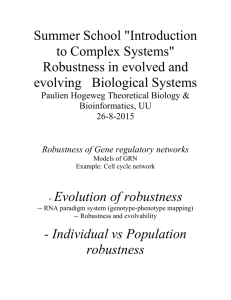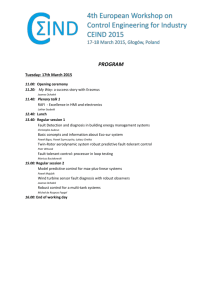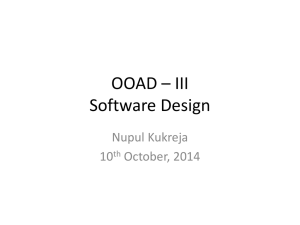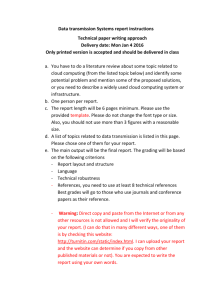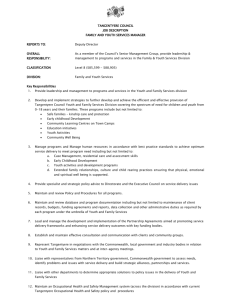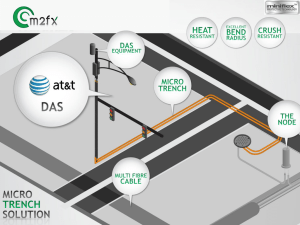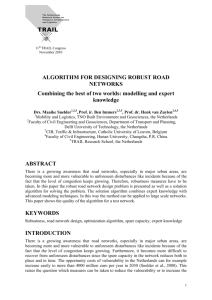STEPS TOWARD ROBUST ARTIFICIAL INTELLIGENCE
advertisement
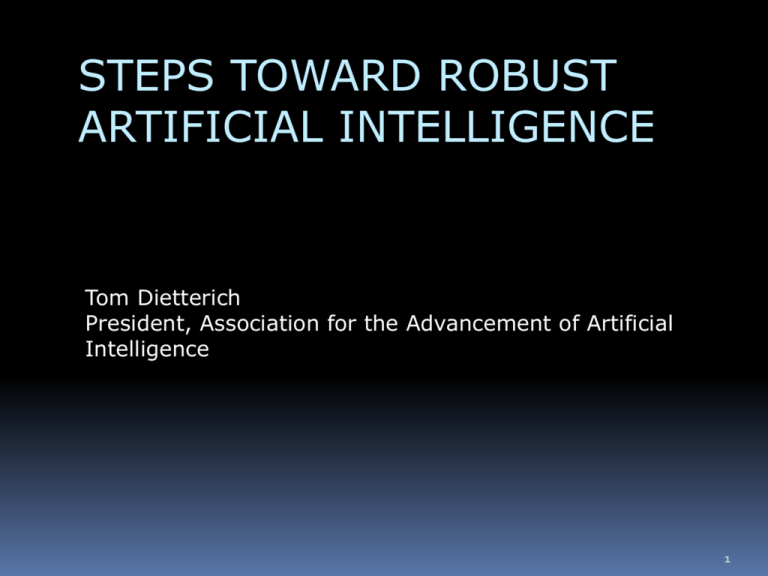
STEPS TOWARD ROBUST ARTIFICIAL INTELLIGENCE Tom Dietterich President, Association for the Advancement of Artificial Intelligence 1 Marvin Minsky (1927-2016) 1961 Credit: Wikipedia CC BY 3.0 2 Minsky: Difference between Computer Programs and People “almost any error will completely paralyze a typical computer program, whereas a person whose brain has failed at some attempt will find some other way to proceed. We rarely depend upon any one method. We usually know several different ways to do something, so that if one of them fails, there's always another.” 3 Outline The Need for Robust AI High Stakes Applications Need to Act in the face of Unknown Unknowns Approaches toward Robust AI Robustness to Known Unknowns Robustness to Unknown Unknowns Concluding Remarks 4 Exciting Progress in AI: Perception Google Speech Recognition 23% Word Error 8% 2013 2014 2015 Credit: Fernando Pereira & Matthew Firestone, Google 5 Image Captioning “a black and white cat is sitting on a chair." Credit: Jeff Donahue, Trevor Darrell 6 Perception + Translation Google Translate from Images Credit: www.bbc.com 7 Skype Translator: Speech Recognition + Translation credit: Skype 8 Exciting Progress in AI: Reasoning (SAT) Credit: Vijay Ganesh 9 Exciting Progress: Reasoning (Heads-Up Limit Hold’Em Poker) Moore’s Law Credit: Michael Bowling 10 Exciting Progress: Chess and Go Silver, et al. (2016) Nature Deep Learning + Monte Carlo Tree Search 2016 Credit: Martin Mueller 11 Personal Assistants Credit: mashable.com Credit:trendblog.net 12 Credit: The Verge Technical Progress is Encouraging the Development of High-Stakes Applications 13 Self-Driving Cars Tesla AutoSteer Credit: The Verge Credit: delphi.com Credit: Tesla Motors 14 Automated Surgical Assistants DaVinci Credit: Wikipedia CC BY-SA 3.0 15 AI Hedge Funds 16 AI Control of the Power Grid Credit: EBM Netz AG Credit: DARPA 17 Autonomous Weapons Credit: Wikipedia Northroop Grumman X-47B Samsung SGR-1 Credit: AFP/Getty Images UK Brimstone Anti-Armor Weapon Credit: Duch.seb - Own work, CC BY-SA 3.0 18 High-Stakes Applications Require Robust AI Robustness to Human user error Cyberattack Misspecified goals Incorrect models Unmodeled phenomena 19 Why Unmodeled Phenoma? It is impossible to model everything It is not desirable to model everything 20 It is impossible to model everything Qualification Problem: It is impossible to enumerate all of the preconditions for an action Ramification Problem: It is impossible to enumerate all of the implicit consequences of an action 21 It is important to not model everything Fundamental theorem of machine learning model complexity error rate ∝ sample size Corollary: If sample size is small, the model should be simple We must deliberately oversimplify our models! 22 Conclusion: An AI system must act without having a complete model of the world 23 Digression: Uncertainty in AI Known Knowns Known-Knowns 1958-1980 Theorem proving Planning in deterministic, fully- observed worlds Games of perfect information 24 Known Unknowns Probabilistic Graphical Models Pearl (1988); Koller & Friedman (2009) Known-Knowns 1958-1980 Known-Unknowns 1980-present Probabilistic Machine Learning Murphy (2012) Planning in Markov Decision Problems Computational Game Theory 25 Unknown Unknowns Natural step on our trajectory toward robust AI Known-Knowns 1958-1980 Known-Unknowns 1980-present Unknown-Unknowns 1980-present 26 Outline The Need for Robust AI High Stakes Applications Need to Act in the face of Unknown Unknowns Approaches toward Robust AI Lessons from Biology Robustness to Known Unknowns Robustness to Unknown Unknowns Concluding Remarks 27 Robustness Lessons from Biology Evolution is not optimization You can’t overfit if you don’t optimize Populations of diverse individuals A “portfolio” strategy Redundancy within individuals diploidy/polyploidy = regressive alleles can be passed to future generations alternative metabolic pathways Dispersal Search for healthier environments 28 Approaches to Robust AI Robustness to Model Errors Robust optimization Regularize the model Optimize a risk-sensitive objective Employ robust inference algorithms Robustness to Unmodeled Phenomena Expand the model Learn a causal model Employ a portfolio of models Monitor performance to detect anomalies 29 Idea 1: Robust Optimization Many AI reasoning problems can be formulated as optimization problems max 𝐽𝐽(𝑥𝑥1 , 𝑥𝑥2 ) 𝑥𝑥1 ,𝑥𝑥2 𝐽𝐽 𝑥𝑥1 , 𝑥𝑥2 subject to 𝑎𝑎𝑥𝑥1 + 𝑏𝑏𝑥𝑥2 ≤ 𝑟𝑟 𝑐𝑐𝑥𝑥1 + 𝑑𝑑𝑥𝑥2 ≤ 𝑠𝑠 30 Uncertainty in the constraints max 𝐽𝐽(𝑥𝑥1 , 𝑥𝑥2 ) 𝑥𝑥1 ,𝑥𝑥2 subject to 𝑎𝑎𝑥𝑥1 + 𝑏𝑏𝑥𝑥2 ≤ 𝑟𝑟 𝑐𝑐𝑥𝑥1 + 𝑑𝑑𝑥𝑥2 ≤ 𝑠𝑠 𝐽𝐽 𝑥𝑥1 , 𝑥𝑥2 Define uncertainty regions 𝑎𝑎 ∈ 𝑈𝑈𝑎𝑎 𝑏𝑏 ∈ 𝑈𝑈𝑏𝑏 … 𝑠𝑠 ∈ 𝑈𝑈𝑠𝑠 31 Minimax against uncertainty max min 𝑥𝑥1 ,𝑥𝑥2 𝑎𝑎,𝑏𝑏,𝑐𝑐,𝑑𝑑,𝑟𝑟,𝑠𝑠 subject to 𝐽𝐽(𝑥𝑥1 , 𝑥𝑥2 ; 𝑎𝑎, 𝑏𝑏, 𝑐𝑐, 𝑑𝑑, 𝑟𝑟, 𝑠𝑠) 𝑎𝑎𝑥𝑥1 + 𝑏𝑏𝑥𝑥2 ≤ 𝑟𝑟 𝑐𝑐𝑥𝑥1 + 𝑑𝑑𝑥𝑥2 ≤ 𝑠𝑠 𝑎𝑎 ∈ 𝑈𝑈𝑎𝑎 𝑏𝑏 ∈ 𝑈𝑈𝑏𝑏 … 𝑠𝑠 ∈ 𝑈𝑈𝑠𝑠 32 Impose a Budget on the Adversary max min 𝐽𝐽(𝑥𝑥1 , 𝑥𝑥2 ; 𝛿𝛿𝑎𝑎 , … , 𝛿𝛿𝑠𝑠 ) 𝑥𝑥1 ,𝑥𝑥2 𝛿𝛿𝑎𝑎 ,…,𝛿𝛿𝑠𝑠 subject to (𝑎𝑎 + 𝛿𝛿𝑎𝑎 )𝑥𝑥1 + (𝑏𝑏 + 𝛿𝛿𝑏𝑏 )𝑥𝑥2 ≤ 𝑟𝑟 + 𝛿𝛿𝑟𝑟 (𝑐𝑐 + 𝛿𝛿𝑐𝑐 )𝑥𝑥1 + 𝑑𝑑 + 𝛿𝛿𝑑𝑑 𝑥𝑥2 ≤ 𝑠𝑠 + 𝛿𝛿𝑠𝑠 ∑ 𝛿𝛿𝑖𝑖 ≤ 𝐵𝐵 𝛿𝛿𝑎𝑎 ∈ 𝑈𝑈𝑎𝑎 𝛿𝛿𝑏𝑏 ∈ 𝑈𝑈𝑏𝑏 … 𝛿𝛿𝑠𝑠 ∈ 𝑈𝑈𝑠𝑠 Bertsimas, et al. 33 Idea 2: Regularize the Model Regularization in ML: Given: training examples (𝑥𝑥𝑖𝑖 , 𝑦𝑦𝑖𝑖 ) for an unknown function 𝑦𝑦 = 𝑓𝑓(𝑥𝑥) a loss function 𝐿𝐿 𝑦𝑦�, 𝑦𝑦 : how serious it is to output 𝑦𝑦� when the right answer is 𝑦𝑦? Find: the model ℎ that minimizes � 𝐿𝐿 ℎ 𝑥𝑥𝑖𝑖 , 𝑦𝑦𝑖𝑖 + 𝜆𝜆 ℎ 𝑖𝑖 loss + complexity penalty 34 Regularization can be Equivalent to Robust Optimization Xu, Caramanis & Mannor (2009) Suppose an adversary can move each training data point 𝑥𝑥𝑖𝑖 by an amount 𝛿𝛿𝑖𝑖 Optimizing the linear support vector objective � 𝐿𝐿(𝑦𝑦�𝑖𝑖 , 𝑦𝑦𝑖𝑖 ) + 𝜆𝜆 𝑤𝑤 𝑖𝑖 is equivalent to minimaxing against this adversary who has a total budget � 𝛿𝛿𝑖𝑖 = 𝜆𝜆 𝑖𝑖 35 Idea 3: Optimize a RiskSensitive Objective Setting: Markov Decision Process For 𝑡𝑡 = 1, … , 𝑇𝑇 agent observes world state 𝑠𝑠𝑡𝑡 agent chooses action 𝑎𝑎𝑡𝑡 according to policy 𝜋𝜋(𝑠𝑠𝑡𝑡 ) world executes action 𝑎𝑎𝑡𝑡 and moves to state 𝑠𝑠𝑡𝑡+1 according to 𝑃𝑃(𝑠𝑠𝑡𝑡+1 |𝑠𝑠𝑡𝑡 , 𝑎𝑎𝑡𝑡 ) agent receives reward 𝑅𝑅(𝑠𝑠𝑡𝑡 , 𝑎𝑎𝑡𝑡 ) 36 Idea 3: Optimize Conditional Value at Risk For any fixed policy 𝜋𝜋, 0.3 P(V) the cumulative return 𝑉𝑉 𝜋𝜋 = ∑𝑇𝑇𝑡𝑡=1 𝑅𝑅(𝑠𝑠𝑡𝑡 , 𝑎𝑎𝑡𝑡 ) will have some distribution 𝑃𝑃 𝑉𝑉 𝜋𝜋 “Minimizing downside risks” The Conditional Value at Risk at quantile 𝛼𝛼 is the expected return of the bottom 𝛼𝛼 quantile By changing 𝜋𝜋 we can change the distribution 𝑃𝑃 𝑉𝑉 𝜋𝜋 , so we can try to push the probability to the right 0.2 𝐶𝐶𝐶𝐶𝐶𝐶𝐶𝐶 = 3.94 0.1 𝐶𝐶𝐶𝐶𝑎𝑎𝑅𝑅 = 3.06 0.0 0 2 𝛼𝛼 = 0.1 4 6 8 V 37 Optimizing CVaR confers robustness Suppose that for each time 𝑡𝑡, an adversary can choose a vector 𝛿𝛿𝑡𝑡 and define a new probability distribution 𝑃𝑃 𝑠𝑠𝑡𝑡+1 𝑠𝑠𝑡𝑡 , 𝑎𝑎𝑡𝑡 ⋅ 𝛿𝛿𝑡𝑡 (𝑎𝑎𝑡𝑡 ) Optimizing CVaR at quantile 𝛼𝛼 is equivalent to minimaxing against this adversary subject to a budget along each trajectory of � 𝛿𝛿𝑡𝑡 ≤ 𝛼𝛼 𝑡𝑡 Chow, Tamar, Mannor & Pavone (NIPS 2014) Conclusion: Acting Conservatively Confers Robustness to Model Errors 38 Idea 4: Robust Inference Credal Bayesian Networks Convex uncertainty sets over the probability distributions at nodes Upper and lower probability models (Cosman, 2000; UAI 1997) Robust Classification (Antonucci & Zaffalon, 2007) Robust Probabilistic Diagnosis (etc.) (Chen, Choi, Darwiche, 2014, 2015) 39 Approaches to Robust AI Robustness to Model Errors Robust optimization Regularize the model Optimize a risk-sensitive objective Employ robust inference algorithms Robustness to Unmodeled Phenomena Expand the model Learn a causal model Employ a portfolio of models Monitor performance to detect anomalies 40 Idea 5: Expand the Model Knowledge Base Construction Cyc (Lenat & Guha, 1990) Information Extraction & Knowledge Base Population NELL (Mitchell, et al., AAAI 2015) TAC-KBP (NIST) Robust Logic (Valiant; AIJ 2001) Learning Models of Actions in Planning and Reinforcement Learning Gil (1994) 41 Idea 5: Expand the Model Risk: Every new item added to a model may introduce an error Inference may propagate these errors The expanded model may not be more accurate than the original model Does not address the fundamental need to act robustly in incompletelymodeled environments 42 Idea 6: Use Causal Models Causal relations are more likely to be robust Require less data to learn [Heckerman & Breese, IEEE SMC 1997] Can be transported to novel situations [Pearl & Bareinboim, AAAI 2011] [Lee & Honavar, AAAI 2013] 43 Idea 7: Employ a Portfolio of Models “We usually know several different ways to do something, so that if one of them fails, there's always another.” --Marvin Minsky 44 Portfolio Methods in SAT & CSP Problem Instance SATzilla: Presolver 1 Presolver 2 Feature Computation Algorithm Selector Final Algorithm Xu, Hoos, Hutter, Leyton-Brown [JAIR 2008] 45 SATzilla Results Cumulative Distribution HANDMADE problem set Presolvers: March_d104 (5 seconds) SAPS (2 seconds) Xu, Hutter, Hoos, Leyton-Brown [JAI R2008] 46 Parallel Portfolios Runtime vs. Oracle Any task where an algorithm can tell it has a solution Race the different algorithms in parallel Stop as soon as one algorithm reports a solution Yu & Epstein [LION 2012]. RSR-WG chooses a subset of methods via machine learning 47 IBM Watson / DeepQA Combines >100 different techniques for analyzing natural language identifying sources finding and generating hypotheses finding and scoring evidence merging and ranking hypotheses Ferrucci, IBM JRD 2012 48 Knowledge-Level Redundancy Minsky: “You don’t really understand something if you only understand it one way” Most AI systems only understand things one way: Computer vision: Object Appearance + human labels Natural Language: Word Co-occurrence statistics + human labels “a black and white cat is sitting on a chair." 49 Multifaceted Understanding There is a person who is the cat’s owner That person does not like the cat sitting on the chair The cat is preventing a person from sitting on the chair People often need to sit on chairs The cat leaves hair on the chair The cat is preventing the person from picking up the book “a black and white cat is sitting on a chair." The cat will soon not be on the chair The cat does this often 50 Achieving Multi-Faceted Understanding We need to give our computers access to many different forms of experience Performing tasks Achieving goals through natural language dialogue Interacting with other agents Examples: Minsky, “Learning Meaning” [1982 MIT TR] Blum & Mitchell, “Multi-View Learning” [1998] Lake, Salakhutdinov & Tenenbaum [Science 2016] 51 Idea 8: Watch for Anomalies Machine Learning Training examples drawn from 𝑃𝑃𝑡𝑡𝑡𝑡𝑡𝑡𝑡𝑡𝑡𝑡 (𝑥𝑥) Classifier 𝑦𝑦 = 𝑓𝑓(𝑥𝑥) is learned Test examples from 𝑃𝑃𝑡𝑡𝑡𝑡𝑡𝑡𝑡𝑡 (𝑥𝑥) If 𝑃𝑃𝑡𝑡𝑡𝑡𝑡𝑡𝑡𝑡 = 𝑃𝑃𝑡𝑡𝑡𝑡𝑡𝑡𝑡𝑡𝑡𝑡 then with high probability 𝑓𝑓(𝑥𝑥) will be correct for test queries What if 𝑃𝑃𝑡𝑡𝑡𝑡𝑡𝑡𝑡𝑡 ≠ 𝑃𝑃𝑡𝑡𝑡𝑡𝑡𝑡𝑡𝑡𝑡𝑡 ? 52 Automated Counting of Freshwater Macroinvertebrates Goal: Assess the Collect specimens via kicknet Photograph in the lab Classify to genus and species www.epa.gov health of freshwater streams Method: 53 Open Category Object Recognition Train on 29 classes of insects Test set may contain additional species 54 Prediction with Anomaly Detection 𝑥𝑥 Anomaly Detector Training Examples (𝑥𝑥𝑖𝑖 , 𝑦𝑦𝑖𝑖 ) 𝐴𝐴 𝑥𝑥 < 𝜏𝜏? yes no reject Classifier 𝑓𝑓 𝑦𝑦 = 𝑓𝑓(𝑥𝑥) Source: Dietterich & Fern, unpublished 55 Novel Class Detection via Anomaly Detection Train a classifier on data from 2 classes Test on data from 26 classes Black dot: Best previous method 56 Anomaly Detection Notes We initially just used monochrome images Feature selection studies showed this was sufficient But color is very useful for detecting novel classes Lesson: Use all of your features when looking for anomalies 57 Related Efforts Open Category Classification [Salakhutdinov, Tenenbaum, & Torralba, 2012] [Da, Yu & Zhou, AAAI 2014] [Bendale & Boult, CVPR 2015] Change-Point Detection [Page, 1955] [Barry & Hartigan, 1993] [Adams & MacKay, 2007] Covariate Shift Correction [Sugiyama, Krauledat & Müller, 2007] [Quinonero-Candela, Sugiyama, Schwaighofer & Lawrence, 2009] Domain Adaptation [Blitzer, Dredze, Pereira, 2007] [Daume & Marcu, 2006] 58 Open Questions Does robustness of the known model confer robustness to unmodeled variation too? Regularization toward “safer” regions When an agent detects that it has entered an anomalous state, what should it do? Is there a general theory of safety? 59 Outline The Need for Robust AI High Stakes Applications Need to Act in the face of Unknown Unknowns Approaches toward Robust AI Lessons from Biology Robustness to Known Unknowns Robustness to Unknown Unknowns Concluding Remarks 60 Concluding Remarks High Risk Emerging AI applications … Require Robust AI Systems AI systems can’t model everything … AI needs to be robust to “unknown unknowns” 61 Existing Approaches to Robust AI Robustness to Model Errors Robust optimization Regularize the model Optimize a risk-sensitive objective Employ robust inference algorithms Robustness to Unmodeled Phenomena Expand the model Learn a causal model Employ a portfolio of models Monitor performance to detect anomalies 62 We have many good ideas We need many more! 63 Acknowledgments Juan Augusto Randall Davis Pedro Domingos Alan Fern Boi Faltings Stephanie Forrest Helen Gigley Barbara Grosz Vasant Honavar Holgar Hoos Eric Horvitz Michael Huhns Rebecca Hutchinson Pat Langley Sridhar Mahadevan Shie Mannor Melanie Mitchell Dana Nau Jeff Rosenschein Dan Roth Stuart Russell Tuomas Sandholm Rob Schapire Scott Sanner Prasad Tadepalli Milind Tambe Zhi-hua Zhou 64 Questions? 65
